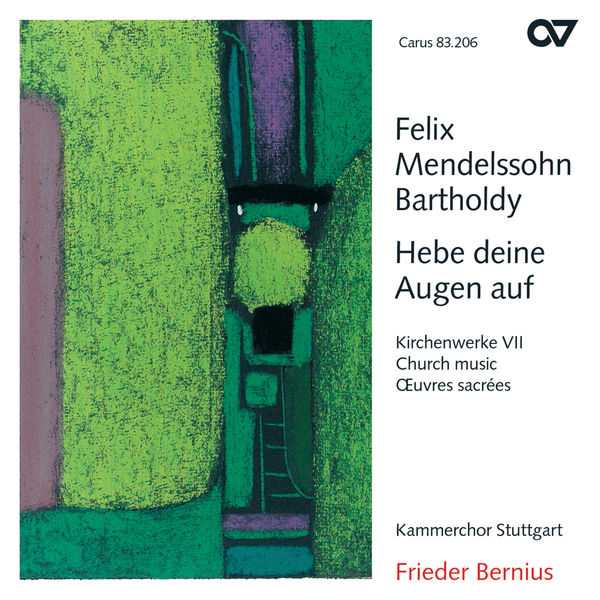
Composer: Felix Mendelssohn
Performer: Kammerchor Stuttgart, Sonntraud Engels-Benz, Iris-Anna Deckert, Ute Feuerecker, Jörg Genslein, Adolph Seidel, Judith Decker, Maria Bernius, Elke Rutz, Ruth Ziesak
Conductor: Frieder Bernius
Format: FLAC (tracks)
Label: Carus
Catalogue: CAR83206
Release: 2006
Size: 198 MB
Recovery: +3%
Scan: cover
01. Zum Abendsegen Op. post.
02. Trauergesang, Op. 116
Geistliche Männerchöre, Op. 115
03. I. Beati mortui
04. II. Periti autem
05. O beata et benedicta, MWV B 22
06. Te Deum, WoO 29
Motetten, Op. 39
07. I. Veni Domine
08. II. Laudate pueri
09. III. Surrexit pastor bonus
Geistliche Lieder, Op. 112
10. I. Doch der Herr, er leitet die Irrenden recht
11. II. Der du die Menschen lässest sterben
3 Motets, Op. 69 “English Church Pieces”
12. II. Jauchzet dem Herrn, alle Welt
Elijah, Op. 70
13. No. 28, Hebe deine Augen
Hebe deine Augen auf is the seventh volume in Frieder Bernius and the Kammerchor Stuttgart’s impressive series of recordings of Mendelssohn’s complete sacred music for Carus-Verlag. Though the music here has been recorded before, many of these arrangements will be unfamiliar to all but the most devoted Mendelssohn enthusiasts. The title track, for example, is already famous from its appearance in the oratorio Elijah, but it takes on a whole new cast in this heavenly arrangement for women’s choir by the composer. The overall program is wonderfully balanced between contrapuntal works for a cappella mixed choir like the Trauergesang, homophonic works for a cappella men’s choir like the Zwei geistliche Männerchöre, intimate works for a cappella women’s choir like the Drei Motetten, sentimental works for solo soprano and organ like the Zwei geistliche Lieder, and massive works for soloists, mixed choir, and organ like the Te Deum. But the unity of the genre and the cohesion of the performances binds the varied repertoire together. Whether written in England, Germany, or Italy for Anglicans, Lutherans, or Catholics, the music here is steeped in Bach’s sacred music, but Mendelssohn’s warm-hearted optimism transforms it into something wholly unique. And whatever the setting and the language, Bernius and the Stuttgart choir turn in polished and devotional performances that translate Mendelssohn’s Victorian-era sacred music into timeless art. Nor should Ruth Ziesak’s smooth and creamy soprano solos and Sonntraud Engels-Benz’s tastefully demur organ accompaniments go unremarked. As previously in this series, Carus-Verlag’s sound is rich, deep, and detailed.